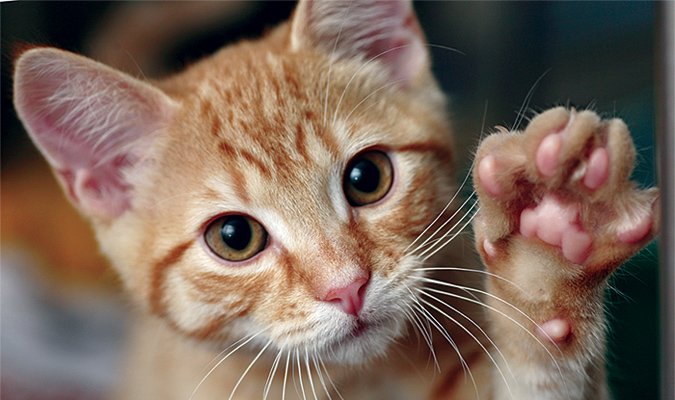suemack | Deposit Photos

A cat uses her paws to scratch to relieve stress, express contentment, mark territory, avoid danger, and fight (if necessary). Amazingly, cat paws are extremely sensitive. They can feel heat, cold, and vibration. They even help keep cats cool (a paw can sweat). And yet, despite the many things cats do with their paws, the health of these unique extremities is often ignored.
Self Health
Cats are fastidious groomers and normally keep the surface of the paw pads clear of dirt and debris such as litter. Still, it’s important that you periodically check to be sure nothing is stuck to the paw pads. If you notice something on a pad, gently clean it off with a warm, damp washcloth. Be aware, though, that this could be a subtle sign of illness.
You may notice your kitty pulling the tips off of her claws. This removes the old, outer sheath, exposing healthy claw beneath. Be sure you have several different scratching posts available. Different textures offer choices and make it less likely that your cat will choose to use the furniture. If you are having a hard time convincing your feline to use a scratching post, try pheromones and catnip on the surface to entice her. Be sure to locate the posts in a spot she seems to frequent. A post hidden off in the basement may not get much use.
If your cat has long hair between the toes, keep it trimmed. Long hair can obscure toe and nail problems. In some cases, nails can grow so long that they curve and grow into the toe pads, which can cause pain and infection. In addition, extremely long hair can decrease the sensitivity and traction of your cat’s feet.
Paw Problems
Extreme temperatures can cause trauma to the paws. Burns from both hot and cold pavement are not uncommon in outside cats. If the weather is extreme, check your cat’s paws carefully when she comes indoors. Watch for cracks or scrapes. If the abrasions are swollen or red—or your cat is lame—have your veterinarian check her.
Cats can develop a rare condition called “pillow foot,” aka plasma cell pododermatitis. The underlying cause is not well understood but may be related to allergies. Early signs include an inflamed pad and lameness. The swelling can become severe. Treatment is aimed at modulating the immune system with medication. If you notice swelling of the paws, a veterinary visit is in order.
With careful attention to paw pad health, problems can be identified early and addressed. Her paws are essential for good mental and physical health.



